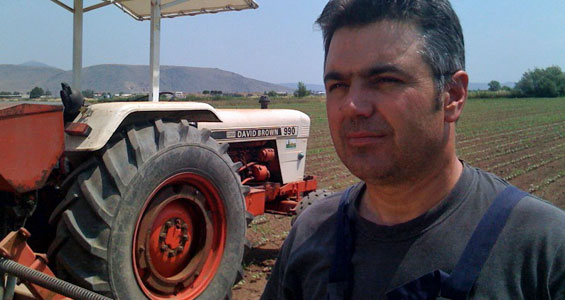Greek farmers rue cotton’s legacy
Cotton growers lose patience with EU as they see their subsidies fade away.

 |
| Yannis says cotton farmers are despairing and afraid of what tomorrow might hold |
During the 1980s and 1990s, Greek cotton farmers prospered with large European Union subsidies, but that aid fell away as the bloc switched its help to African growers.
As European elections begin, the farmers, in common with many other Greeks, are losing their enthusiasm for the EU and are increasingly sceptical about its policies.
Keep reading
list of 4 itemsCould shipping containers be the answer to Ghana’s housing crisis?
Thousands protest against over-tourism in Spain’s Canary Islands
Holding Up the Sky: Saving the Indigenous Yanomami tribe in Brazil’s Amazon
Yannis Vagkos is a worried man.
For five generations, his family has been growing cotton on the plains outside the southern Greek town of Livadia.
| In video |
|
|
Now, as a new crop is coming up, he wonders whether he can carry on much longer.
“We used to call cotton white gold,” he says, “but comparing cotton farming now with the way it was in the 1990s is like comparing day and night.”
He says the prices he can get for his cotton are barely one-sixth of what they were in the early 1990s, while the cost of inputs such as fertiliser and diesel has risen dramatically.
“We are in despair, we are afraid of tomorrow, and we don’t know what’s going to happen to us,” he says.
Yannis’ anxieties say much about Greece’s relationship with the EU.
Corrupt system
Living standards in Greece have risen dramatically since the country joined the bloc in the early 1980s, and, at least initially, nobody did better than the cotton farmers.
On the back of generous subsidies, production boomed; the area used for cotton cultivation increased fourfold, and soon Greece was growing three-quarters of all European cotton.
Often this expansion was done with scant regard for the environment; cotton is a thirsty crop, and its production has wreaked havoc with Greece’s precarious water supplies.
 |
| Struggling African producers like Mali point to the inequity of generous EU subsidies [EPA] |
Moreover, Greek farmers, and politicians, became notorious for their corrupt exploitation of an already lavish subsidy system.
“We cotton farmers made a big mistake,” Yannis says.
Subsidies were paid according to the amount of land under cultivation, and often farmers would exaggerate this – sometimes by two or three times – in order to get a bigger subsidy.
And, according to Yannis, “nobody would even bother to check up” on these claims, because of collusion between farmers and local political bosses.
But the EU has been under increasing pressure to reduce support for its cotton farmers, and allow competition from poorer regions of the world.
European cotton is only a very small proportion of global production, and has little impact on international prices, but struggling African countries, such as Burkina Faso, and Mali, point to the inequity of European cotton-producers receiving such generous subsidies.
Brussels has already modified its subsidies to give farmers less incentive to grow cotton, and may take more drastic action in 2013, with further changes to Europe’s Common Agricultural Policy.
Road transport
In February this year, Greek farmers staged a series of protests.
Yannis joined in a blockade of the national highway that runs between Athens and the north.
“We are frightened about what will happen after 2013, when we think our funding will be cut, and the state has not planned for this,” he says.
Meanwhile, in the capital, political parties are doing their best to work-up some public enthusiasm for the European elections.
There is a fair amount of cynicism and apathy in the air, but Greeks remain among the most enthusiastic supporters of EU membership in the entire continent.
Nonetheless, some commentators detect that Greeks may have become a little bit more realistic in their expectations of what Brussels can do for them.
Free-ride over
Greece is no longer one of the very poorest countries in the EU, and there are others ahead in the queue for largesse.
 |
| Workers load a bale of cotton at the port of Salonica in 1950 [GALLO/GETTY] |
“There used to be a sense of taking from the EU,” says Christina Badouna, who researches Greek public opinion, “but slowly as the years go by, and … each member’s obligations are raised, people realised that this was also a relationship about giving”.
In other words, Greeks may be moving from outright Euro-enthusiasm to a more sceptical assessment of what the EU can do for them.
Back on his farm, Yannis knows that without substantial EU or government support, he can never produce cotton as cheaply as China or India.
He would like to see more selective support for the areas of Greece that have grown cotton for generations, as opposed to those which jumped on the subsidies bandwagon in the 1980s and 1990s.
And he is hoping to go into organic, high-end production, to differentiate his product.
Yannis is a hard-working, engaging man, and, not yet 40, so time is on his side. But the cotton farmers of Greece now know that that they can no longer enjoy a free-ride.
